|
|
|
Sort Order |
|
|
|
Items / Page
|
|
|
|
|
|
|
| Srl | Item |
| 1 |
ID:
082704
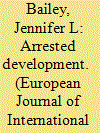

|
|
|
|
|
| Publication |
2008.
|
| Summary/Abstract |
The International Whaling Commission's moratorium on commercial whaling took effect in 1986, seemingly marking the adoption of a new norm, that commercial whaling was no longer acceptable. But this norm has failed to become institutionalized. This article uses the norm life-cycle approach as developed by Finnemore and Sikkink (1998) to account for this failure. The effort ran aground because the norm proved unexpectedly ambiguous, a supporting epistemic community failed to emerge, the norm conflicted with other powerful norms, the prestige of the key anti-whaling states declined relative that of whaling states, and NGO tactics failed to win over the publics in key whaling states and instead created a counter-boomerang effect. The attempt may have resulted in the emergence of an alternative norm, but actors must act now to institutionalize it.
|
|
|
|
|
|
|
|
|
|
|
|
|
|
|
|
| 2 |
ID:
127343
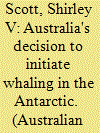

|
|
|
|
|
| Publication |
2014.
|
| Summary/Abstract |
On May 31, 2010, Australia instituted proceedings before the International Court of Justice in the case of Whaling in the Antarctic (Australia v. Japan). Although Australian politicians had for some time threatened such a course of action, the decision to proceed with international litigation took many observers by surprise, most basically because Japan appeared to be in a strong legal position and the risks associated with the case appeared greater than Australia's prospects for success. This article examines the background to the whaling dispute and suggests two ways in which litigation in the World Court may contribute to resolution of the dispute no matter the legal outcome of the case.
|
|
|
|
|
|
|
|
|
|
|
|
|
|
|
|
| 3 |
ID:
117851
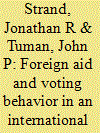

|
|
|
|
|
| Publication |
2012.
|
| Summary/Abstract |
This study examines the relationship between Japanese foreign aid disbursement and recipient state membership and voting in the International Whaling Commission (IWC). Focusing on 104 countries for the period 1994-2005, we investigate whether Japan gives more aid to IWC members that vote with Japan. The effects of the independent variables are estimated with a linear mixed regression model. Controlling for other possible influences on official development assistance (ODA) disbursements, and employing different measures of dyadic voting similarity, the study finds Japanese aid concentrates in members of the IWC that are microstates. The findings of the paper also indicate that microstate members of the IWC who align their votes with Japan are more likely to receive Japanese ODA. By demonstrating that Japan's strategy is focused on microstates, the study provides a more refined understanding of the mechanisms Japan employs to end the IWC's moratorium on commercial whaling.
|
|
|
|
|
|
|
|
|
|
|
|
|
|
|
|
| 4 |
ID:
168379
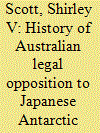

|
|
|
|
|
| Summary/Abstract |
Whaling has been a consistent theme in Australia’s relations with Japan since the 1930s, Australia having endeavoured to regulate, restrict, or bring to a complete halt Japan’s Antarctic whaling virtually since it began. Australia’s motivations have been mixed, involving at various points, some combination of protection of Australia’s coastal whaling industry, concern for Australia’s security, for safeguarding Australia’s Antarctic territorial claim, and more recently, concern for Australia’s whale-watching industry and/or for the whales. Since environmental consciousness became a primary factor in the 1970s, Australian policy has been aligned with that of anti-whaling non-governmental organizations (NGOs), albeit that certain actions of NGOs have caused difficulties for the Australian Government. Law – inclusive of legal argument in the course of diplomacy, domestic laws, and international litigation – has been a mechanism of influence used by the Australian Government and NGOs. This paper traces Australia’s legal opposition from its beginnings until Japan’s announcement in December 2018 that it would end Antarctic whaling.
|
|
|
|
|
|
|
|
|
|
|
|
|
|
|
|
| 5 |
ID:
172588
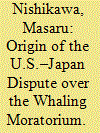

|
|
|
|
|
| Summary/Abstract |
On December 26, 2018, the administration of Japanese Prime Minister Shinzo Abe announced it would end its participation in the International Whaling Commission (IWC). While Japanese national parliamentarians who belonged to the pro-whaling caucus welcomed the decision to resume commercial whaling, the decision faced condemnation.
|
|
|
|
|
|
|
|
|
|
|
|
|
|
|
|
|
|
|
|
|